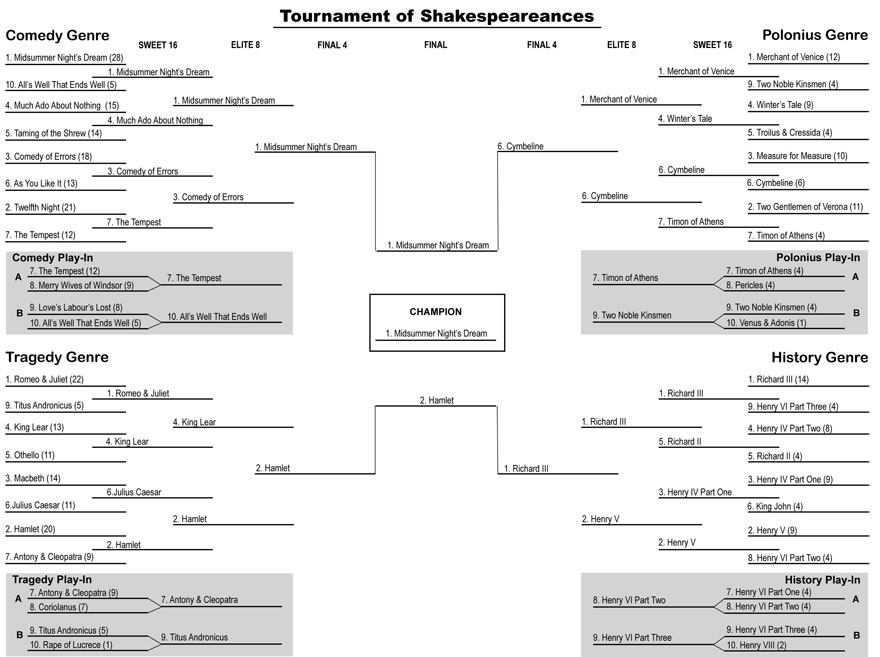A Tournament of Shakespeareances
The Elite Eight: Living in the Moment
For a tournament overview, click here
For the tournament play-in matches, click here
For results of the First Round matches, click here
For results of the Sweet 16 matches, click here
It has been said that Shakespeare is for all time. Nevertheless, the truly special Shakespeareances happen in a specific intersection of time, place, and people while experiencing his works. What makes live theater such a singular art form is the all-important adjective live: It is a living, breathing thing happening in the moment of its very existence. William Shakespeare wrote and first staged his plays more than 400 years ago, yet they continue to live—really live—in modern theaters. How much each is better able to come to vibrant life in the moment of its performances makes the difference in these Elite Eight matchups to determine the Tournament of Shakespeareances' Final Four.
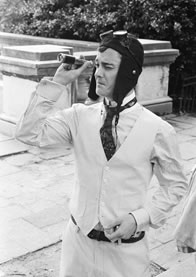
George K. Wells as Antipholus of Syracuse in Hudson Warehouse's Edwardian Era–costumed, outdoor production of The Comedy of Errors. Photo by Joseph Hamel, Hudson Warehouse.
Comedy Genre
1. A Midsummer Night's Dream (28) vs. 3. The Comedy of Errors (18)—These two plays rode to the Comedy Genre title matchup based on numerous outstanding ensemble productions and individual performances, but one has more often capitalized on surroundings and circumstances. We've seen various Dromios deliver their jokes like vaudeville comedians playing off audience responses (American Shakespeare Center 2011 and 2014, Cincinnati Shakespeare Company 2014). Ironically, for all its theatrical mayhem and audience confusion, Comedy of Errors has generated its funniest moments of memory for the exact opposite reason: theatrical discipline. The Hudson Warehouse in 2012 set its outdoor Errors in Edwardian finery, juxtaposing the plot confusions against a strict social order; and the American Shakespeare Center (ASC) 2011 Actors' Renaissance Season production had a laugh-till-you-cry beating sequence carried out in extreme slow motion. However, the Folger's 2011 Errors production, set in the framework of a touring amateur British acting society performing the play with masks, fumbled with a faux ad lib in the final scene when the company played an awkward moment of realizing they were short the number of actors needed for the all-ensemble ending; the ensuing stage business was really awkward for the audience.
Midsummer Night's Dream productions, on the other hand, have thrived on directors' and actors' imaginations in so many segments of the play, with blocked out or extempore, especially in the Rude Mechanicals staging of Pyramus and Thisbe. In a 2004 production at the ASC's replica Blackfriars Playhouse, with audience members sitting on "gallant stools" on stage, James Beard playing Bottom playing Pyramus killed himself first by stabbing his "left pap," then sniffing on a bag of glue, then crawling across the floor to a woman who had taken off her shoes, one of which Bottom picked up, deeply inhaled its odor, and fell dead. Another Bottom in that space, Rick Blunt in a 2011 performance for a school matinee audience, delivered Bottom's wake-up speech and prompted the audience to fill in the title of his dream. When several students offered “Midsummer Night's Dream,” he dropped his arms and head in disappointment. “No," he said: "Bottom's dream,” tuning Shakespeare's line to a duh! tone. “Because it hath no bottom,” he continued, drawing another laugh. But Shakespeare himself might have knocked down the biggest score in this matchup, or at least earns credit for an assist. It came in the Clever By Half 2012 production at the outdoor Oak Grove Theater in Verona, Va., amid a canopy of tall oaks, including one growing up through the stage itself. Throughout the performance, we could hear the pings and pangs of acorns hitting tin roofs and bleachers. And then, just as Lysander calls Hermia "you acorn," an acorn crashed onto the stage right next to her. Intended? Not by humans, based on the shock in both Hermia's and Lysander's faces and Helena turning upstage to cover her laughter.
It is on such magic and living moments that A Midsummer Night's Dream wins the Comedy Genre bracket and heads into the Final Four.
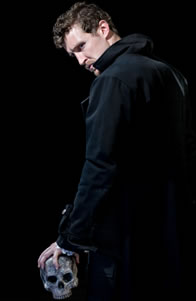
Patrick Earl as Hamlet in the ASC's touring production Photo by Michael Bailey, American Shakespeare Center.
Tragedy Genre
2. Hamlet (20) vs. 4. King Lear (13)—My favorite Shakespeare play, King Lear, comes into this Elite Eight matchup as the clear underdog to Hamlet, a consensus contender for title of greatest piece of literature ever written. Hamlet first blew me away when I read it in college—after I first read Lear. But Lear first endeared itself to me in a live theater production, the Trevor Nunn–helmed Royal Shakespeare Company (RSC) production in 1977. Already enthralled, I was stunned when I heard the first howl of Donald Sinden's Lear coming from, seemingly, Drury Lane outside the Aldwych Theatre. On the second howl, he appeared carrying Cordelia, and I lost it—and he still had one more howl to go, rattling our bones as well as our sinews. King Lear wins or loses as a theatrical moment based on whether the production delivers your tears with the ending or the Lear-Cordelia reunion scene preceding it, either through great acting, great staging, or both. On the Shakespeareances.com list of 13 Lear's seen, five scored with the ending, one missed with the ending but scored with the reunion (Theatre for a New Audience, 2014), one missed with King Lear and Cordelia but scored tears with Edgar (Public 2014), and Colm Feore in the 2014 Stratford Festival production scored a trey, inducing tears with "Reason not the need" along with the reunion scene and ending.
Hamlet has no comparable benchmark. A particularly affecting Gertrude (Andrus Nichols at Shakespeare Forum 2012) or Ghost (René Thornton Jr. at ASC 2011) can bring on the tears, but Hamlet himself, not so much. But just as scholars can find no end to analyzing this composition, actors and directors find Hamlet to be infinite in faculty, of infinite space, and of infinite jest. I've seen 20 productions of Hamlet on stage: I've seen 20 different Hamlets, and I've seen 20 different Hamlets. Of the 20 Hamlets I've seen, the most important one is the latest full-cast production, ASC's current touring production, in part because it happens to be only the latest set of revelations into this play. A text-centric (Quarto version), bare-stage, non-conceptual staging, it is one of the freshest presentations I have ever seen, full of unforeseen yet insightful twists and turns. In fact, I could say that of all the productions I've seen, and it will likely hold true for however many more I am lucky enough to attend.
I love King Lear, but proof of Shakespeare's ability to write living theater that continues revealing itself 400 years on is Hamlet, and thus will it represent the Tragedy Genre bracket in the Final Four.
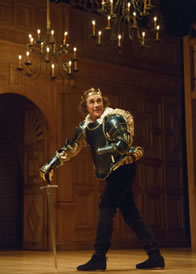
Mark Rylance as Richard III in the Shakespeare's Globe original practice production after it moved to Broadway. Photo by Joan Marcus, Shakespeare on Broadway.
History Genre
1. Richard III (14) vs. 2. Henry V (9)—In Richard III, Queen Margaret has appeared out of nowhere to spew her venom and curses at the courtiers of the Yorkist court. She saves her last for her chief nemesis, Richard of Gloucester, and Sarah Fallon playing Margaret in the 2012 ASC Actors' Renaissance Season production got right in Richard's face to deliver her curses; Benjamin Curns's Richard responded by spewing a mouthful of water right back in her face. The audience gasped, and on opening night, so did the other actors who didn't know Curns and Fallon had agreed to the device before going on stage. These two actors were now playing these roles for the third straight year, having done the Henry VI prequel in the years before, and they realized it was the right in-the-moment thing to do. Biggest concern: collateral spray hitting patrons on the gallant stools on stage. Antony Sher in his landmark Richard-on-crutches portrayal for the RSC in 1985 similarly was inspired during a preview performance to thrust one of his crutches at Lady Anne during their courtship scene, lifting up her dress. Penny Downe playing Anne was stunned—and agreed it needed to stay in for the rest of the run. Richard, like Shakespeare's later great creation of villainy, Iago, establishes a close, confidential relationship with his audience, which also gives actors playing him more opportunities for singular theatrical moments. On Broadway, American audiences applaud the first appearance of a star, and did so when Mark Rylance strolled on stage as Richard. Rylance remained in character, pleasantly surprised at the welcome and using this wall-breaking moment to slide into our confidence. Curns described to me that in one performance of his Richard, a couple of young men sitting on the gallant stools were urging him on under their breaths—until after he ordered the murder of the princes in the Tower; like the characters in the play, these two patrons turned against Richard, looking at Curns warily and shrinking from him whenever he addressed them.
By contrast, Henry V isn't given to such spur-of-the-moment reactions to or interactions with the audience. I've seen Chorus open a beer as he addresses the audience (John Woodvine with the English Shakespeare Company in 1986), and I've seen an audience vibrating during the 2013 Folger production's wonderful courtship scene between Henry and Katherine. However, the most intimate portrayals of Henry I've seen have been on film, Kenneth Branagh's in 1989 and Tom Hiddleston's in the 2013 Hollow Crown series, while it is the otherwise unfortunate film Anonymous that provides the best example I've seen of how Henry can become one with his audience in a theater.
When it comes to stagecraft, Richard III is among Shakespeare's greatest accomplishments, in his time and ours; thus, it is Richard III that easily romps into the Final Four wearing the History Genre crown.
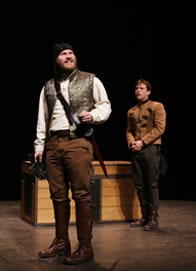
Andy Grotelueschen as Cloten and Paul L. Coffey as Pisanio in the Fiasco Theater's New York production of William Shakespeare's Cymbeline. Photo by Ari Mintz, Fiasco Theater.
Polonius Genre
1. The Merchant of Venice (12) vs. 6. Cymbeline (6)—Shylock was whetting his knife, a long silent build-up to the moment he would plunge it into Antonio's breast to carve out a pound of flesh owed him as payment for a bond. This Shylock happened to be Al Pacino in the Public Theater's production of The Merchant of Venice after it had moved to Broadway in 2011; so, yeah, he was intense. Then a cell phone rang in the audience. Pacino turned toward the direction of the offending ring and, whether in character or as himself, pondered a different breast from which to exact his bond. This is one of those singular live theater moments, certainly, but it's a technical foul not of Shakespeare's or Shylock's doing. Similarly, an RSC production in 1988 playing up the play's virulent racism (as far from comedy as any Merchant I've seen) inspired snickering from a matinee audience comprised mostly of school groups, and squealing laughter when Antonio spit in the face of Shylock. Merchant gets a big lift with Elizabeth Jernigen's portrayal of Portia in the Maryland Shakespeare Festival's 2012 Bare Bard Repertory production. In the final scene, as she berated Bassanio about giving the ring she had given him to the judge (really her in disguise), Jernigen moved in and out of the audience and came to my wife and me. Gesturing to us as she told Bassanio, "If you had known the virtue of the ring, or half her worthiness that gave the ring, or your own honor to contain the ring, you would not then have parted with the ring." I held up my left hand with my wedding ring, prompting a chagrined reaction from Bassanio (JJ Area). Merchant's problem on stage is that it is a comedy that has become a tragedy over the years.
Cymbeline, however, has never known what it's supposed to be since being placed among the tragedies in the First Folio. The first three productions of the play I attended treated it as serious drama. The Shakespeare Theatre Company in 2011, however, set the play as a fairy tale read to a little girl. The ASC's 2012 text-centric production made it a fun fairy tale, with John Harrell's portrayal of Cloten so hilarious he was even funny in death. Meanwhile, Fiasco Theater in New York was creating a critical sensation with its production of Cymbeline using six actors and a versatile trunk. The actors mingled with the audience before the play and during intermission, sat on the outskirts of the stage when not in the action providing sound effects (we see stagecraft in action), broke into song whenever possible, and presented Cymbeline as the tall tale it is.
Coming down to the wire in a dead heat in this matchup, here's the final point. Though Cymbeline is a romance with tragical elements, Shakespeare added a character identified only as "Second Lord" whose sole purpose is to insult Cloten in asides to the audience. Merchant's direct-audience device is Launcelot Gobbo, the servant clown, and his big joke is to abuse his blind father: not funny, and most productions cut the scene. The buzzer sounds, and though it is only the sixth seed in the catch-all Polonius bracket, Cymbeline is in the Final Four.
Eric Minton
March 30, 2015
The Brackets
Click on the tournament brackets below to download a PDF version. The play titles on the PDF version are linked to their individual "Productions Seen" page on Shakespeareances.com.
For a tournament overview, click here
For the tournament play-in matches, click here
For results of the First Round matches, click here
For results of the Sweet 16 matches, click here
For results of the Final Four matches, click here
For the result of the title match, click here
Comment: e-mail editorial@shakespeareances.com
Start a discussion in the Bardroom



 Find additional Shakespeareances
Find additional Shakespeareances